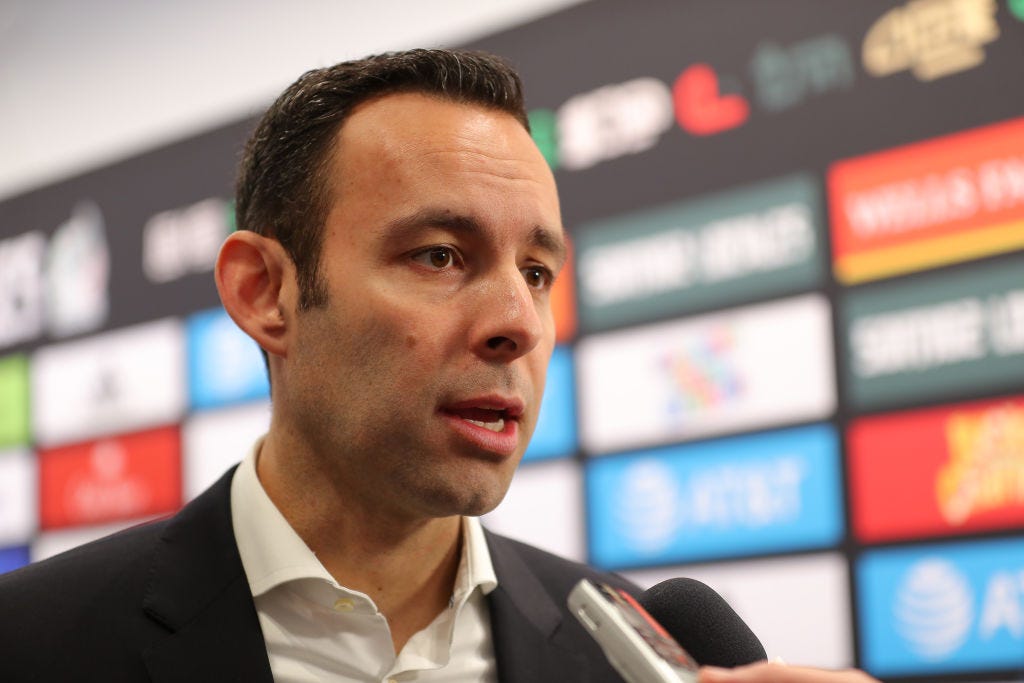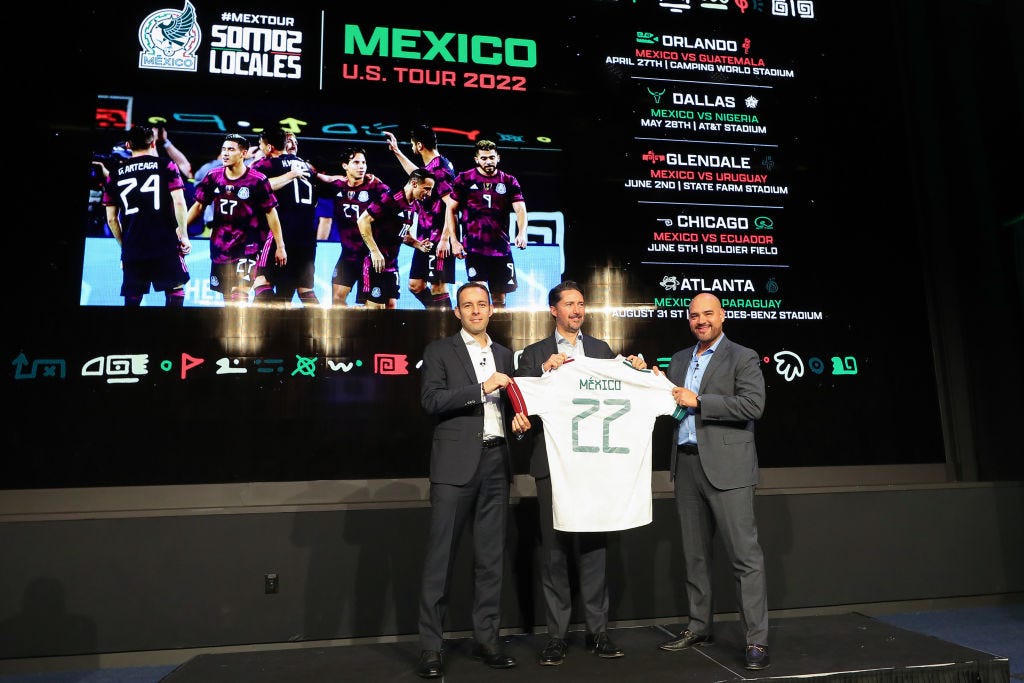🇲🇽 SUM, FMF still in love after more than 19 years together
While there's no deal done beyond 2022, the relationship doesn't appear headed for divorce
When the Mexico men’s national team heads out for its June 5 friendly against Ecuador at Soldier Field, it will be the 100th time El Tri has played a #MexTour game on American soil in partnership with Soccer United Marketing.
It’s a big, round number, a remarkable milestone and one that is evidence of the long partnership between the Federación Mexicana de Fútbol and SUM, Major League Soccer’s marketing arm founded in 2002 as the league sought to find its financial footing.
The arrangement led to Mexico playing five friendly matches a year in the U.S., generally to sold-out or near-capacity crowds in stadiums built for American football.
With the passion and fervor El Tri fans in the U.S. have when presented the chance to see the national team in their home city, sponsors’ desire to reach the elusive Mexican-American dollar, and the fact that prices for tickets, concessions and parking can be charged at higher prices in the U.S. than in Mexico, the reasons both the FMF and SUM like the setup are clear.
While there’s no guarantee the partnership continues, with the current agreement between the groups set to expire at the conclusion of this year, things are headed in the direction of a new deal.
“We're in the process of having conversations with the Mexican federation to extend that very successful in football partnership for both organizations,” Pablo Zarate, the Vice President of International Properties for SUM told me last week in Dallas. “We do see our role as really making sure that the Mexican national team has the best preparation for different competitions. It can be Gold Cup, it can be, like this year, the 2022 FIFA World Cup.
“For us, it's really important to bring the Mexican national team closer to their fans.”
SUM definitely has gotten El Tri closer to the hundreds of thousands of fans it has in the U.S., but not without criticism. Every game Mexico plays in the U.S. is a game it doesn’t play in Mexico, and many of the country’s biggest cities have gone years without a visit from most popular team in the nation. Meanwhile, areas like Dallas-Fort Worth, Los Angeles and Phoenix host the team far more frequently.
To fit the matches into an already crowded international schedule, games often are played outside of FIFA windows, meaning Mexico sends a team mostly based in Liga MX while opponents also have to get creative with their squads.
That can lead to low-quality contests infamously branded “moleros”. Fans and sometimes even managers have expressed frustration with the SUM deal and the way it limits the type of competition Mexico can play. In addition to fewer games on Mexican soil, the agreement also means Mexico rarely has the chance to go to South America or Europe to play top teams in hostile environments.
Concerns from fotball-focused fans and managers aside, the games in the U.S. show no sign of slowing. There are rumblings that an extension of the partnership between the two groups may be announced before the end of the current agreement.
“Our role continues to be the same. Our current partnership expires at the end of this year, but we're already in those conversations because of, again, the long-term vision that we have in both organizations,” Zarate said. “Hopefully we can make some announcements in the in the coming days and weeks.”
While Yon de Luisa, president of the FMF, also didn’t reveal any of the specifics of the conversations, he indicated the FMF would like to re-up with SUM.
The federation president said the long-term partnership the federation announced with teams and promotors in Dallas-Fort Worth could be a road map for the federation to put deeper roots in key U.S. markets. That doesn’t happen without SUM.
“We’re looking forward to extending,” De Luisa said of the Dallas deal, which also expires this year. “This is something we need to work out with SUM, our strategic partner here in the U.S., but having this type of relationship, not only on the sports side with soccer but also with music and educational programs, it’s the true meaning of having true fan engagement.
“For us, this is something that we not only look forward to extending in Dallas, but also to extending to other cities because this has been a fantastic tool for us to have here.”
Another enticing prospect, both commercially and on the field, is the idea of Mexico playing another tournament in the United States rather than settling for friendly matches.
Reports emerged from South America last week that there are chats between Concacaf and CONMEBOL officials about the idea of replicating the combined Copa America Centenario in 2016 with a U.S.-based tournament in 2024.
SUM was awarded the rights to sell sponsorship and media rights to promote the June 2016 tournament in December 2015.
Despite the quick turnaround, forced when the governing bodies had to reclaim the rights from a group linked with that year’s corruption investigations, the tournament was a financial success.
While Zarate said it’s not up to SUM to come to an agreement, the marketing company would be interested in a deal should another tournament come to fruition.
“That's more a question for Concacaf and CONMEBOL. We’ll let them continue those conversations,” he said. “The Copa America Centenario in this country was a huge success for both confederations, so we're happy to be included and be part of this process and this project.
“Hopefully this comes to a resolution soon, and we can see a bit more of that in the coming years because I think it's a tremendous event.”


As the FMF conducts conversations with SUM about the next chapter, the United States Soccer Federation is allowing its own long-standing agreement with SUM to expire after this year.
“We look forward to building upon the relationships we will continue to have with the FMF (Mexican Federation) and CONCACAF,” SUM CEO and MLS Commissioner Don Garber told The Athletic after last year’s announcement about the separation with USSF.
Zarate said losing USSF won’t “affect the way we’re thinking about the Mexican national team and their future in this country,” If the statements made last week are any indication, that future involves SUM.








